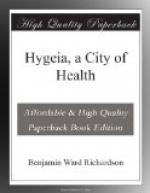And, as smoking and drinking go largely together, as the two practices were, indeed, original exchanges of social degradations between the civilised man and the savage, the savage getting very much the worst of the bargain, so the practices largely disappear together. Pipe and glass, cigar and sherry-cobbler, like the Siamese twins, who could only live connected, have both died out in our model city. Tobacco, by far the most innocent partner of the firm, lived, as it perhaps deserved to do, a little the longest; but it passed away, and the tobacconist’s counter, like the dram counter, has disappeared.
The streets of our city, though sufficiently filled with busy people, are comparatively silent. The subways relieve the heavy traffic, and the factories are all at short distances from the town, except those in which the work that is carried on is silent and free from nuisance. This brings me to speak of some of the public buildings which have relation to our present studies.
It has been found in our towns, generally, that men and women who are engaged in industrial callings, such as tailoring, shoe-making, dressmaking, lace-work and the like, work at their own homes amongst their children. That this is a common cause of disease is well understood. I have myself seen the half-made riding-habit that was ultimately to clothe some wealthy damsel rejoicing in her morning ride act as the coverlet of a poor tailor’s child stricken with malignant scarlet fever. These things must be, in the ordinary course of events under our present bad sanitary system. In the model city we have in our mind’s eye, these dangers are met by the simple provision of workmen’s offices or workrooms. In convenient parts of the town there are blocks of buildings, designed mainly after the manner of the houses, in which each workman can have a work-room on payment of a moderate sum per week. Here he may work as many hours as he pleases, but he may not transform the room into a home. Each block is under the charge of a superintendent, and also under the observation of the sanitary authorities. The family is thus separated from the work, and the working man is secured the same advantages as the lawyer, the merchant, the banker now possesses: or to make the parallel more correct, he has the same advantage as the man or woman who works in a factory, and goes home to eat and to sleep.
In most towns throughout the kingdom the laundry system is dangerous in the extreme. For anything the healthy householder knows, the clothes he and his children wear have been mixed before, during, and after the process of washing, with the clothes that have come from the bed or the body of some sufferer from a contagious malady. Some of the most fatal outbreaks of disease I have met with have been communicated in this manner. In our model community this danger is entirely avoided by the establishment of public laundries, under municipal direction. No person




